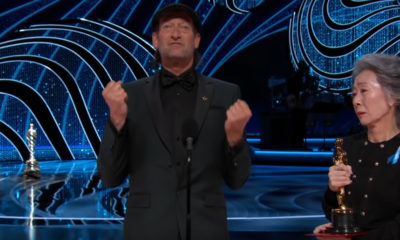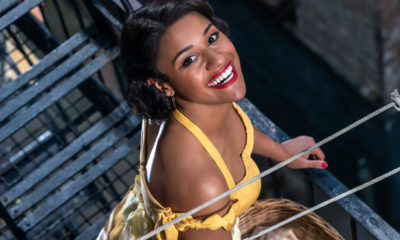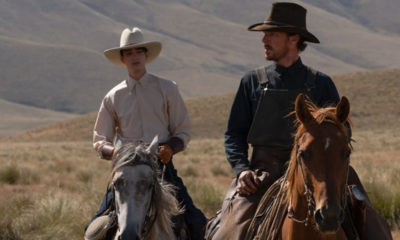Television
New films feature gay superhero, Tammy Faye, and feel-good drag
Cumberbatch takes on another gay role in ‘Power of the Dog’
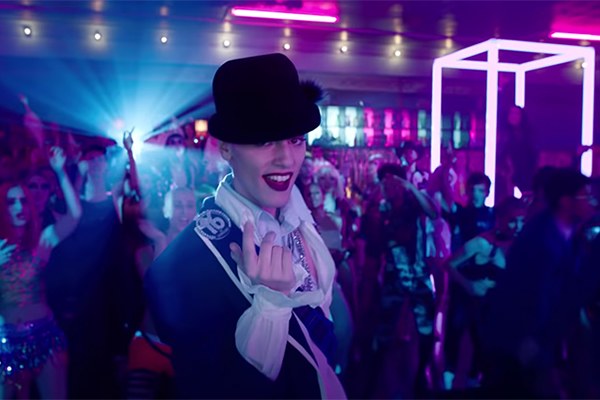
It’s fall again, and that means it’s time to look forward to the things we love about this time of the year – and no, I’m not talking about pumpkin spice. I’m referring, of course, to the new movies headed our way, and there are quite a few this year that should be of interest to LGBTQ+ viewers. Fortunately, as usual, the Blade is here to help you plan your own must-see list for the season with the help of our handy guide below.
Giddy Stratospheres (Sept.14): If you’re a movie fan who also has a taste for musical nostalgia, this gritty love letter to the indie music scene of the 2000s from writer/director Laura Jean Marsh is definitely for you. Shot entirely during lockdown in the UK, it follows a pair of indie kids and best friends (Jamal Franklin and Marsh herself) as they party their nights away on a quest for the ultimate in hedonistic euphoria and excitement. If memories of donning boots, ripped tights, and eyeliner for a night at the club aren’t enough, there’s also a fabulously queer leading character and soundtrack featuring a smorgasbord of retro hits from the likes of Franz Ferdinand, The Futureheads, The Walkmen, Le Tigre, The Rapture, Art Brut, The Cribs, Black Wire, The Rocks, Theoretical Girl, Pink Grease and more. Available via VOD now.
Everybody’s Talking About Jamie (Sept. 17): Delayed due to COVID but finally here is this bubbling and buzzy film version of the hit West End musical by Tom MacRae, inspired by a 2011 television documentary, in which a gay 16-year-old named Jamie New (Max Harwood) overcomes teasing, bullying, and a complicated home life to realize his dream of becoming a drag queen – with help from a loyal best friend (Lauren Patel), a supportive mom (Sarah Lancashire), and an aging drag mentor named Loco Chanel (Richard E. Grant). Translated to the screen by original stage director Jonathan Butterell and adapted into a screenplay by MacRae himself, it’s won early praise by critics for its “infectious” spirit and is probably the odds-on favorite to be the feel-good queer movie of the season. With Shobna Gulati, Ralph Ineson, Samuel Bottomley, Sharon Horgan, and Charlotte Salt, it also features a cameo from Roy Haylock (better known as Bianca Del Rio, of course), who played the role of Loco Chanel onstage. VOD and streaming on Amazon Prime.
The Eyes of Tammy Faye (Sept. 17): Like the now-classic documentary of the same name, this much-anticipated biopic is an intimate look at the extraordinary rise, fall and redemption of televangelist Tammy Faye Bakker, who with her husband Jim Bakker created the world’s largest religious broadcasting network before financial improprieties, scheming rivals, and scandal toppled their carefully constructed empire. Legendary for her indelible eyelashes, her idiosyncratic singing, and her eagerness to embrace people from all walks of life, she went on to become an unlikely but beloved LGBTQ icon, vocally supporting the community and helping to reduce stigma around AIDS through the platform afforded by her celebrity. Directed by Michael Showalter, it stars Jessica Chastain as Tammy Faye, with Andrew Garfield as Jim and a supporting cast including Cherry Jones, Fredric Lehne, Louis Cancelmi, Sam Jaeger, Gabriel Olds, Mark Wystrach, and Vincent D’Onofrio. In Theaters.
On the Fringe of Wild (Oct. 13)
In this Canadian import set in the early 2000s, a sensitive and shy small town teen named Peter runs away from his homophobic father during a hunting trip designed to “make him a man.” Lost in the cold Ontario wilderness, he meets Jack – another teen on the run from his toxic family – and a romance buds between them as they hide away in a secluded cabin; when they are inevitably pulled back into the real world, they’re forced to confront their sexuality, their mental health, and the oppressive home life that threatens to drive them apart. Directed by Emma Caralfamo from a bleak but hopeful screenplay by Sorelle Doucet, it features trans actor Harrison Browne as Peter and Cameron Stewart as Jack, with Mikael Melo, Andrew Bee, Audrey Nesbitt, Bernadette Medhurst, Andrea Pavlovic, and Adam Jenner in support. VOD.
Eternals (Nov. 5)
Marvel Studios gets a jump on the holiday blockbuster rush with the long-awaited (and long-delayed) release of this new addition to their comics-to-screen franchise, an epic and ensemble-centered action fantasy that introduces, among other characters, Brian Tyree Henry’s Phastos – the first openly gay superhero to be depicted in a Marvel film. It even promises an onscreen kiss between Tyree and Haaz Sleiman, who portrays Phastos’ husband. We’ll take a wait-and-see attitude on whether or not it’s a blink-and-you’ll-miss-it moment. Directed by Oscar winner Chloé Zhao, it has an all-star cast that includes Gemma Chan, Richard Madden, Kit Harrington, Salma Hayak, Kumail Nanjiani, Lauren Ridloff, Barry Keoghan, Don Lee, and Angelina Jolie.
Isaac (Nov. 16):
Coming from Spain is this debut feature from writer/directors Angeles Hernández and David Matamoros, adapted from a stage play by Antonio Hernández Centeno and centered on two friends named Nacho and Isaac, who had an intense relationship as teens and meet again by chance after 20 years. Nacho, now financially successful and trying to have a baby with his wife Marta, proposes an arrangement with struggling entrepreneur Denis and his partner Carmen: If they will provide the “surrogate belly” for Marta’s pregnancy, he will give them the money they need to open their gourmet restaurant. The deal, of course, opens the door for a lot of resurfaced feelings that forces the two men to discover themselves at the risk of losing the apparent stability they now have. Starring Pepe Ocio and Iván Sánchez (who won the Best Actor prize for his performance as Nacho at the 2020 Malaga Film Festival), it also features Maria Ribera, Erika Bleda, and Nacho San José. VOD.
The Power of the Dog (Nov. 17):
Squeaking in just before the holiday season is this adaptation of the 1967 Thomas Savage novel by the same name, directed by renowned filmmaker Jane Campion and starring screen heavyweights Benedict Cumberbatch and Kirsten Dunst. Set in 1925 Montana, it’s a character-driven drama in which a brutal but charismatic rancher (Cumberbatch) finds his life disrupted when his brother (Jesse Plemons) brings a new wife (Dunst) and son (Kodi Smit-McPhee) home to the ranch. At first cold and cruel, he begins to take his new step-nephew under his wing, and a relationship begins to form that opens up memories of a buried past and awakens him to the possibilities of love. On the one hand, it’s garnered predictable controversy over the casting of the straight-identifying Cumberbatch in a high-profile queer role (his second after playing Alan Turing in “The Imitation Game”) – but on the other, it’s one of the best-reviewed upcoming films on the slate so far. In addition, Campion is a cinematic master whose work here won her the Silver Lion for directing at this year’s Venice Film Festival, so it’s worth taking that into consideration before you decide to give this one a pass. In theaters.
Television
‘Modern Family’ creator returns to form with hilarious ‘Reboot’
Show about a show ditches tired mockumentary format
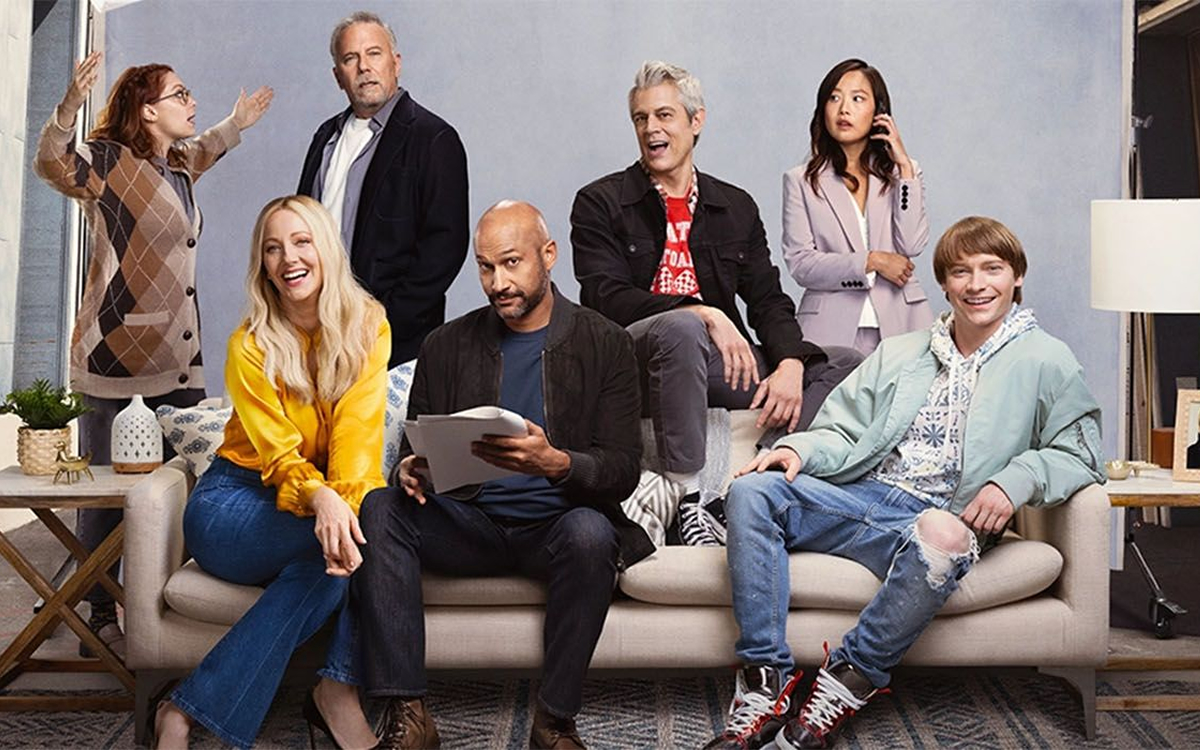
TV veteran Steven Levitan already had a lot of success as a writer, showrunner, and producer before the premiere of “Modern Family” – a series he co-created with Christopher Lloyd – in 2009. That show turned out to be a cultural phenomenon, helping to redefine and normalize the representation of LGBTQ relationships on TV by including a gay couple within its ensemble of central characters while also becoming a long-running fan-favorite, winning scores of awards (including nine primetime Emmys) and being nominated for scores more before airing its final season in 2020. Even with a resume that includes shows like “Wings,” “Frasier,” “The Larry Sanders Show,” and “Just Shoot Me,” that’s got to be considered a career-topping triumph.
Now, Levitan is back with a new show, “Reboot,” which premiered on Hulu Sept. 20, and from its very first pre-credit sequence it signals a welcome return to the same rapid-fire comedic style that kept “Modern Family” on everybody’s weekly watchlist for 11 years – still inclusive, with prominent queer characters and storylines, but thankfully without the mockumentary format.
“Reboot” is a good-naturedly irreverent send-up of the Hollywood entertainment machine featuring “Crazy Ex-Girlfriend” star Rachel Bloom as Hannah, a TV writer who gets greenlighted on her pitch for a revival of “Step Right Up,” a beloved sitcom from the early 2000s. She manages to convince the original cast to reprise their roles as the show’s “wacky family” – despite their complicated offscreen history – by promising to adapt the show for a contemporary audience, eliminating the corny, outdated humor and shifting toward a more sophisticated, realistic tone. At the first table read, however, Hannah’s plan for a reimagined series is met with a significant obstacle – the unexpected presence of the original sitcom’s creator, Gordon Gelman (Paul Reiser), who has wielded his industry clout to insert himself into the mix as a showrunner and ensure that “woke” ideas about comedy don’t get in the way of the laughs.
Obviously, this scenario provides a ripe field for jokes about the cultural conflicts that have become a fact of life in 2022 – mostly around the differing attitudes between older and younger generations, always a sure-fire bet for relatable comedy. The “OK Boomer” sparring at its core is common fodder these days, but Levitan and his creative team know comedy well enough to make it feel fresh – and their secret is to make sure that the characters are always the main attraction.
In this case, they’ve given us plenty of them to choose from. Besides Hannah and Gordon, whose rivalry for the reins quickly becomes just one of many thorns in their relationship dynamic, we also get the leading players of “Step Right Up”: Reed Sterling (Keegan-Michael Key), a Yale-trained thespian who ditched the show’s first run to pursue a movie career that never materialized; Bree Marie Johnson (Judy Greer), a once-popular star who left showbiz for a now-failed marriage to an obscure Scandinavian Duke; Clay Barber (Johnny Knoxville), a “bad boy” stand-up comic known less for his talent than for being a train wreck; and Zack Jackson (Calum Worthy), a former child star who seems to have reached his mid-20s without actually growing up. Rounding out the main ensemble is Krista Marie Yu as Elaine, a young production exec transplanted from the tech industry whose fish-out-of-water incongruity provides a necessary outsider perspective amid the show-biz histrionics that surround her.
There’s a host of supporting characters, too – a roomful of writers, for instance, hilariously bridging the generation gap with their common love of comedy even as they clash over cultural values. Drawn in broad strokes, all of them could easily be dismissed as generic tropes, stock figures updated to fit the latest cultural zeitgeist; that they come off as fully realized human beings instead of lazy stereotypes is a testament to Levitan and the real-life writers’ room responsible for bringing them to life.
It’s also a testament to the actors who play them. Key and Greer have the biggest challenge, in many ways; their characters, cut from the same egocentric cloth as so many other parodies of vain and pretentious Hollywood stars and clearly designed to be adorably insufferable, come off in early episodes as simply insufferable. As the season progresses, fortunately, their skill as performers permits them (and their characters) to rise above the flaws and foibles and win us over. The ever-reliable Knoxville does what he does best – sending up his own wild-man persona – and occasionally reminds us that he’s not a bad actor, when he gets the chance; Worthy, an ex-Disney-kid also spoofing his own real-life image, likewise injects surprising doses of winning humanity as the show goes on.
As for Bloom, essentially the main character though surrounded by an ensemble of zanies, she holds her own with all the juggernaut talent she used to make “Crazy Ex-Girlfriend” a wildly popular cult hit; required to be a grounding force while dealing with her own whirlwind of personal and professional dysfunction, she succeeds more than well enough to anchor the show. Finally, Reiser brings his status as a venerable sitcom legend to give his old-school character an appropriate presence, while making him much more layered and likable than the Archie Bunker-ish throwback we expect him to be.
With such a solid cast doing the heavy lifting onscreen, “Reboot” is able to cast its satirical net wide enough to poke fun at our rapidly changing culture without losing the important human connection that keeps its never-ending bombardment of one-liners – something for which Levitan’s previous shows have been widely known and admired – from feeling hollow. That doesn’t mean the comedy ever lulls; on the contrary, even the show’s most tender and meaningful moments – which often take us by pleasant surprise – are punctuated by zingers. And while the series leans hard into the kind of uncomplicated vibe that usually marks popular mainstream sitcoms, it also lets itself play at more complex levels, getting a lot of comedic mileage out of the inescapable “meta” quality of being a show about a show – for example, the fictional series, like the real one, is produced by Hulu, just one such cheeky touch among many that make it feel more subversive and iconoclastic than perhaps it really is.
What might work even more to the benefit of “Reboot” than the considerable lineup of talent it boasts both on and behind the screen is its format – and we’re not just talking about its choice to eschew the mockumentary thing, a masterfully innovative tactic that has now become tired from overuse, even on Emmy-favored “Abbot Elementary.” In the new era of streaming content, the 23-episode season feels like an increasingly outmoded way of doing things; with only eight episodes to undertake, there’s far less chance of stretching the material (and our patience for it) thin, or of running out of ideas and undermining the show’s integrity with sub-par writing just to pad things out.
Unsaddled from that burden, “Reboot” manages to be laugh-out-loud funny throughout each episode of its first season. That alone is enough for us to look forward to season two.
Television
A queer-friendly year for the Emmys – almost
One glaring problem? Chapelle’s aggressively transphobic “comedy” special
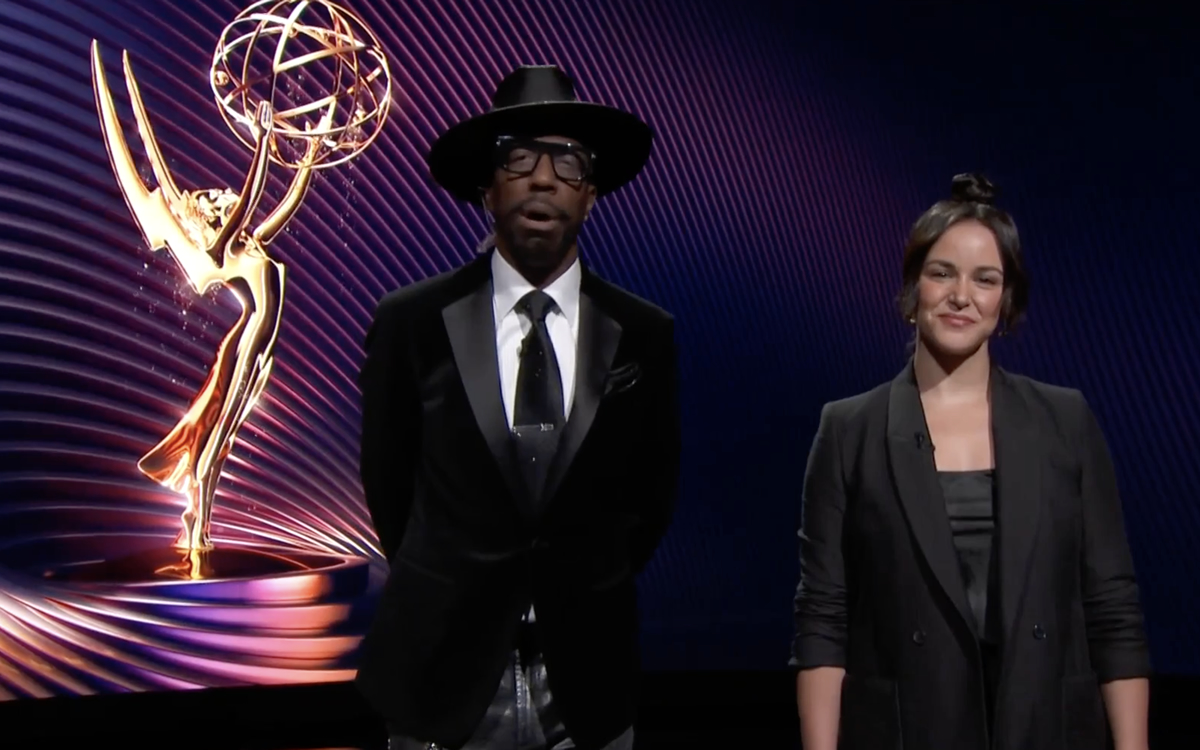
Earlier this week, the Academy of Television Arts and Sciences kicked off Hollywood’s second “Awards Season” of the year with the announcement of its nominations for the 74th Annual Emmy Awards, with actors JB Smoove and Melissa Fumero doing the honors in an early morning virtual ceremony on July 12.
That means it’s time for the Blade to break down the nominees for our readers and call attention to the LGBTQ+ shows and talent that are included in the mix – and since the word count on the complete list is probably comparable to a 19th-century Russian novel, that’s no small feat, so we’ll just say “You’re welcome” right now.
At first glance, the list might not look too queer-inclusive. Out of all the nominees for the leading actor categories, there is only one out LGBTQ+ individual – Sarah Paulson, whose performance as Linda Tripp in FX’s “Impeachment: American Crime Story” made the cut for Best Lead Actress in a Limited Series – and that was for playing a straight character.
The supporting categories look somewhat queerer, however. Nominations in the Comedy Series division include both Bowen Yang and two-time previous winner Kate McKinnon for NBC’s “Saturday Night Live,” alongside previous nominee Hannah Einbinder for HBO’s “Hacks.”
In addition, Murray Bartlett scored a nod in the Limited Series Supporting Actor category for his work in HBO’s “The White Lotus,” while Nathan Lane and Jane Lynch each received nominations, as Best Guest Actor and Actress in a Comedy Series, respectively, for their turns on Hulu’s “Only Murders in the Building.”
Comedian Jerrod Carmichael, who came out publicly in his 2022 HBO stand-up special “Rothaniel,” was also singled out as Best Guest Actor in a Comedy for hosting “SNL.”
For off-camera contributions, Carmichael was also nominated for Outstanding Writing for a Variety Special for “Rothaniel,” and bisexual “White Lotus” creator Mike White scored a nod for both Outstanding Writing and Direction for a Limited or Anthology Series or Movie.
Other shows that received nominations for queer non-acting contributions include “American Crime Story: Impeachment” (Sarah Burgess, Writing for a Limited Series, Movie, or Drama Special), “Only Murders in the Building” (Jamie Babbit, Cherien Dabis, Directing for a Comedy Series), and Hulu’s “The Dropout” (Francesca Gregorini, Directing for a Limited Series).
Considering the sheer number of total nominations (there are 119 categories, after all), the number of openly queer contenders feels like a mere handful – especially in an era when television has made notable strides toward LGBTQ+ inclusion. Yet precisely for that reason, we can’t fault the Emmys for a lack of queer-friendliness based simply on the number of queer individuals it has chosen to recognize – because many of the shows represented in the list, including several major contenders in major categories, are fully queer-inclusive.
Most notable, arguably, are the number of queer characters represented among the acting categories. In addition to the nominees noted above, several straight-identifying performers are nominated for playing LGBTQ+ roles.
Colin Firth’s starring turn in HBO’s true crime drama “The Staircase,” as bisexual accused murderer Michael Peterson, scored him a nod as Best Lead Actor in a Limited Series; Jodie Comer and Sandra Oh each received nominations for Lead Actress in a Drama Series for playing the lesbian assassin/lovers of Hulu’s “Killing Eve,” and their competition includes previous winner Zendaya, whose drug-addicted bisexual teenager is at the center of HBO’s hugely queer “Euphoria,” as well as Reese Witherspoon for her performance as a newly-out queer newscaster in Apple TV’s “The Morning Show”; Alex Borstein earned a richly-deserved nod for Best Supporting Actress in a Comedy for her performance as queer comedy manager Susie Myerson in Amazon’s “The Marvelous Mrs. Maisel”; Kaitlyn Dever is nominated as Best Supporting Actress in a Limited Series or Movie for playing a lesbian coal miner in Hulu’s “Dopesick”; and heavy-hitters John Turturro and Christopher Walken each got nominations for Best Supporting Actor in a Drama for playing gay men in Apple TV’s “Severence.”
Looking through a wider scope, it’s easy to see that queerness, while it may not always be front-and-center, permeates many of the shows nominated the list, and even if they didn’t make the cut in the acting categories, the recognition they receive is still a victory of LGBTQ+ inclusion.
For Best Comedy Series, the unapologetically queer “Hacks” – which won awards at last year’s ceremony for writing, directing, and Lead Actress Jean Smart – leads the pack, with “The Marvelous Mrs. Maisel” and ABC’s much-buzzed-about “Abbot Elementary” likely running close behind. Other queer-inclusive shows in the category are FX’s “What We Do In the Shadows,” HBO’s “Barry,” and “Only Murders in the Building.”
For Drama, Showtime’s “Yellowjackets,” which has numerous queer female characters, might just ride its surprise hit status to victory on Emmy night, though the aforementioned “Euphoria” is likely to be a strong favorite. “Severence” and Netflix’s hugely popular “Stranger Things,” which also include LGBTQ+ characters, are in the running, too.
In the Best Limited Series Category, “The White Lotus” – likely the favorite to win – and “Dopesick” are both heavily queer-inclusive.
Other LGBTQ+-relevant nominations of note include nods in the Best Reality Competition Show category for Amazon’s “Lizzo’s Watch Out for the Big Grrrls,” Bravo’s “Top Chef,” Netflix’s “Nailed It,” and VH1’s perennial Emmy favorite “RuPaul’s Drag Race,” which scored a few additional nods including one for RuPaul himself as Outstanding Host for a Reality or Competition Program; in the latter category, his competition includes all five of the hosts of Netflix’s “Queer Eye” (another Emmy favorite), which also picked up nods for its Production Design and Casting; YouTube’s “The Randy Rainbow Show” was nominated for Outstanding Short Form Comedy, Drama or Variety Series; and the race for Best Variety Sketch Series includes “SNL” and HBO’s “A Black Lady Sketch Show.”
There are also, of course, the inevitable snubs and disappointments. Omitted this year were Harvey Guillén (the loveable Guillermo of “What We Do in the Shadows”) and previous nominee Carl Clemons-Hopkins (“Hacks”) as Best Supporting Actor in a Comedy Series, as well as breakout trans actress Hunter Schafer (“Euphoria”); coming up empty-handed were also FX’s acclaimed LGTBQ-adjacent “Reservation Dogs” and HBO Max’s “Station Eleven” for Best Comedy and Drama Series, respectively.
Still, there will always be fans disappointed that their favorites didn’t make the cut, and one of the good things about being on a successful television series is the possibility of getting another chance next year, so our overall assessment of the Academy’s choices this year doesn’t suffer because of a few oversights.
There is, however, one glaring problem that gives us reservations about Emmy’s solidarity with the LGBTQ+ community – the choice to reward Netflix’s “The Closer,” Dave Chapelle’s aggressively transphobic stand-up “comedy” special with not one, but two nominations, for Outstanding Pre-Recorded Variety Special and Outstanding Directing for a Variety Special. Any recognition for a show that is essentially centered on the validation of transphobia sends a deeply troubling message.
For that reason, we can’t quite give the Emmys a pass this year on their commitment to acceptance and equality for all, despite the high marks on their scorecard for all the queer content and talent in this year’s competition. Instead, we have no choice but to strongly object to the Academy’s elevation of transphobia through the inclusion of Chapelle’s show among all these shining examples of what true LGBTQ+ representation looks like.
That doesn’t mean we won’t be rooting alongside all our readers for our favorites when the presentation of the Primetime Awards airs on September 12 – but no matter how many queer winners there may be that night, as far as we’re concerned, this year’s Emmys are already an epic fail.
You can find the full list of nominees on the Emmy website.
Television
‘Umbrella Academy’ and Elliot Page elevate trans representation
Netflix hit a subversive metaphor for America itself
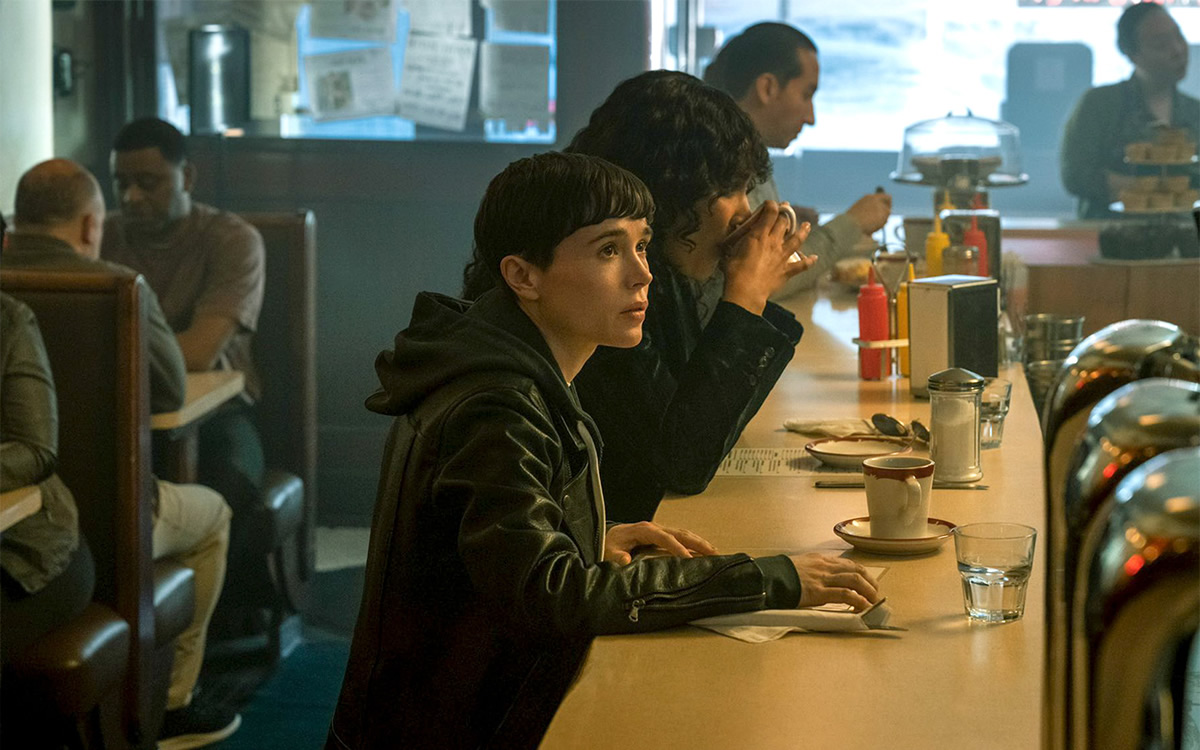
There’s been a lot of bad news over these last couple of weeks, and there’s no way to sugar-coat it. The conservative Supreme Court seems determined to roll back the clock to an era when rights belonged only to a privileged few, and that’s just one current in an endless stream of worrisome developments that make watching the news enough to give even the most optimistic among us a sense of, well, impending doom.
Still, in such overwhelming times, it’s crucial to remind ourselves that good things happen, too, even if they tend to get lost in the shadows; and even in an easily catastrophized set of circumstances like the one we’re facing now, there’s a cultural moment taking place that deserves to be acknowledged — and you don’t even have to turn on the news to see it, because it’s on Netflix.
In 2019, when the streaming giant premiered its adaptation of “The Umbrella Academy,” Gerard Way and Gabriel Bá’s Dark Horse comic book series about a dysfunctional family of superhero siblings, it was already at the forefront of the industry in terms of LGBTQ representation in its lineup; with two queer characters among its leading cast, the new show was no exception. Well-received by critics, the series was also embraced by fans, becoming one of Netflix’s most-streamed titles of the year. A second season debuted in 2020, further expanding the tale’s queer storylines and meeting with similar success.
Now, after a pandemic-slowed production schedule, the much-anticipated third season has finally appeared, and it’s a ray of positivity in our current sea of woes. The reason has nothing to do with the show’s wild-and-wooly fantasy narrative about bickering superheroes time-hopping from one narrowly averted apocalypse to another — although as with all the best fantasy stories, it’s easy to draw a few notable parallels with real life. Indeed, it’s a real-life parallel that gives this season its real significance — and it’s only there because of Elliot Page.
Page has been part of “Umbrella Academy” since the beginning, and is the show’s biggest “name,” but when he came out as trans in 2020, his presence in the cast took on even more importance. How the series would handle his transition suddenly became the most important question on the minds of the show’s creators – especially since, as showrunner Steve Blackman recently revealed, the scripts had already been written. To their great credit, the show’s creative team handled things right; they brought in trans writer Thomas Page McBee, who worked with Page and Blackman to craft a rewrite that would allow Vanya Hargreeves, Page’s already-established character, to transition in the story, too.
The result is perhaps a bigger success than any of them – or of us – might have expected. On the surface of it, the change is executed without much ado. Early in the season’s first episode, Vanya simply shows up at a family meeting and announces that he is now Viktor, and that’s that. His siblings accept him, and everyone just moves on to the business of figuring out how to save the universe from yet another existential threat.
Wisely, however, the show doesn’t merely make the change and then move forward as if nothing has really happened. Viktor’s new gender identity may have nothing to do with the main plot, but it is clearly pertinent to himself and his siblings, and we get to watch these relationships adjust as they process the change. These moments are small, but important; it’s a testament to the show’s excellent writing that each character meets the moment in a way that’s in keeping with their own unique persona. That none of them chooses to be unkind makes for good “behavior modeling,” certainly, teaching audiences by example how to approach similar encounters with transitioning loved ones in their own lives — but it also rings true within the narrative itself, underscoring the deep loyalty to each other that repeatedly emerges as this not-as-broken-as-they-think family’s most valuable asset in its fight against universal destruction. After all, when you’re facing the end of the world, what hero has time to argue about pronouns?
The show, too, gives both Page and Viktor ample opportunities to experience those little “aha” moments that are so much a part of transitioning into a more complete, more authentic version of oneself. From the self-discovery of seeing himself in his first “boy” haircut, to the expansion of empathy he feels for the struggles faced by his siblings, to his ability to just be, at long last, comfortable enough in his own skin to dance with complete abandon despite the impending end of the world – all these and more are nuances that don’t NEED to be there, but were nevertheless included by choice. “The Umbrella Academy,” violent and irreverent as it may be, has never been shallow, but in its determination to present a positive and authentic transition experience and honor that journey for the character, actor, and audience alike, it sounds new and unexpected depths, and it’s all the better for doing so.
It’s worth pointing out some other reverberations that Viktor’s transition sets off in the overall premise of the show. He is after all, part of an ethnically diverse family whose members all struggle to overcome the childhood trauma they experienced under the supposed care (really exploitation) of a narcissistic adoptive father, a man with all the earmarks of a white imperialist colonizer who rationalizes his abuses in the name of the greater good. Damaged, divided, and combative, they’ve long since grown disillusioned with the old man’s vision, yet it continues to shape their lives and their behavior as surely as if it were in their mutated DNA. Add to this the fact that the apocalypses they keep having to avert tend to be of their own creation, and it’s hard not to see “The Umbrella Academy” as a subversive metaphor for America itself – yet one that is enlightened enough to embrace Viktor Hargreeves (and his other queer sibling, the pansexual fan-favorite Klaus, played by Robert Sheehan) with complete acceptance.
Clever allegorical touches aside, it’s this season’s pitch-perfect, elegantly drawn transition of Viktor that elevates the series to historic status. It does what no show has ever done before: it gives us a character that fans already know and love, in whom they are already invested, and then they let us see that character come out as their authentic self. From Edith Bunker’s doomed drag queen friend Beverly on “All in the Family,” to Pedro Zamora’s presence in “The Real World,” to Cam and Mitch’s long-running gay marriage on “Modern Family,” game-changing queer representation on popular television shows has played an immeasurable but undeniable role in advancing LGBTQ acceptance in our culture; Viktor Hargreeves is just such a character, a benchmark in trans representation that feels like the harbinger of a sea change to come, despite the ominous threats of our seemingly unhinged SCOTUS.
“The Umbrella Academy” can’t save us from the impending apocalypse in our own world, but maybe it can supply us with the hope we need to do it ourselves.
-

 State Department4 days ago
State Department4 days agoState Department releases annual human rights report
-

 South America2 days ago
South America2 days agoArgentina government dismisses transgender public sector employees
-

 District of Columbia2 days ago
District of Columbia2 days agoCatching up with the asexuals and aromantics of D.C.
-

 Politics5 days ago
Politics5 days agoSmithsonian staff concerned about future of LGBTQ programming amid GOP scrutiny

